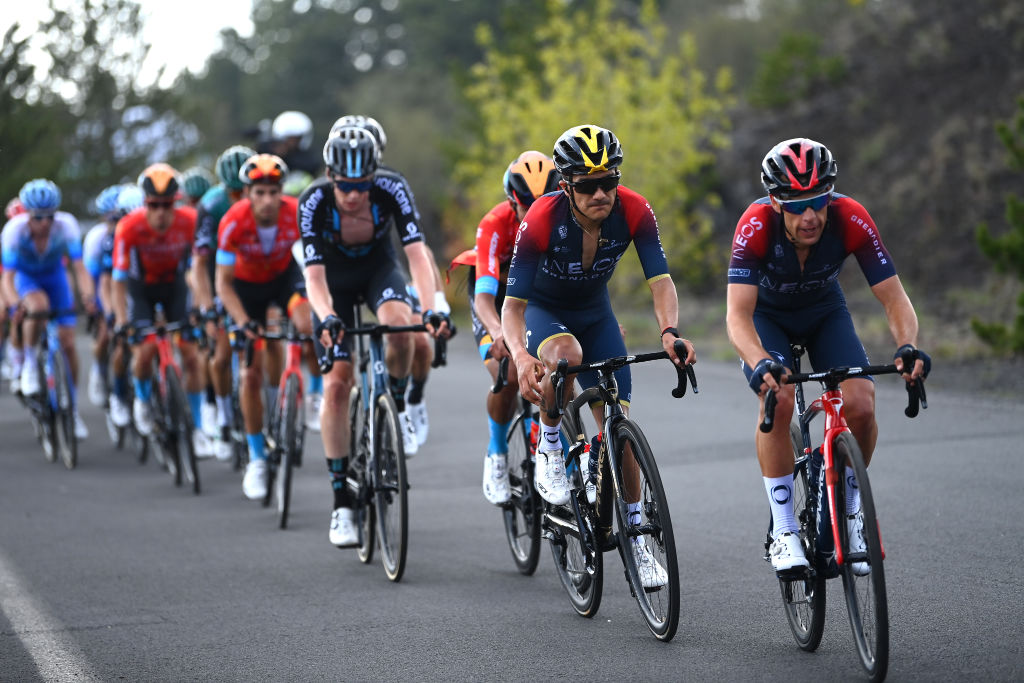Ineos Grenadiers pile on the pressure on Giro d'Italia's Mount Etna stage
British team turned up heat mid-way through final climb

Following the Giro d'Italia Budapest time trial on Saturday Ineos Grenadiers celebrated a notable collective display of strength that saw them place four riders in the top 20 and once again on Mount Etna, rather than individual success, the British squad turned in another impressively powerful group performance.
Sicilian-born former Giro d'Italia leader Salvatore Puccio and British national champion Ben Swift did much of the spadework keeping the daylong break of 14 within an acceptable distance time-wise, then Jhonathan Narvaez, Pavel Sivakov and Richie Porte upped the pace hard in the group on the steepest sections of the climbs.
Finally, Richard Carapaz provided the highest-profile ride of the Ineos Grenadiers team when his blistering late acceleration strung out the GC group within sight of the finishing gantries, although not to the breaking point.
But as the Ecuadorian commented afterwards, it was the team's performance that really impressed on the Etna stage.
"Today was harder than it looked, the heat made it complicated early on and there was quite a hard pace at the end," Carapaz told Italian TV RAI when asked about their strategy and if he expected riders as important as former Giro winners Tom Dumoulin (Jumbo-Visma) and Vincenzo Nibali (Astana Qazaqstan) to be dropped.
"What my team did was very significant and I am very happy with how they did it. It was what we wanted as a squad."
In what was the one real effort by any of the GC contenders' teams to toughen the pace behind the break, Ineos Grenadiers' move ultimately saw Porte move up to ninth overall at 2-04 on new leader Juanpe López (Trek-Segafredo), with Carapaz slotting in just behind at 2-06 in 11th.
Get The Leadout Newsletter
The latest race content, interviews, features, reviews and expert buying guides, direct to your inbox!
Asked if his own performance and the loss of Miguel Angel López and Vincenzo Nibali (Astana Qazaqstan) and Dumoulin strengthened his condition as a top favourite, Carapaz ducked the question and answered simply "I'm here to win, and there are some hard days to come."
Teammate Castroviejo revealed that their strategy was not so much one of open aggression as to lay down a steady pace and see how it affected the rest of the peloton.
"It was more a tactic of defence than attack as we've always seen somebody crack on Etna and we saw how Dumoulin suffered this time," he told reporters.
The decision to up the pace had been more spur of the moment than a previously designed strategy, he said, because "Richard felt good on the stage and I was pleased with it personally, too, because I haven't competed since the Volta a Catalunya so I was very satisfied with what I could do."
"We did what we had to do, it wasn't actually the plan to do that, but Richard's obviously in good nick and confident so it was good to see," added Richie Porte at the finish to reporters. "We can take confidence from what we did as a team because we all did our bit. It's a good sign."
Alasdair Fotheringham has been reporting on cycling since 1991. He has covered every Tour de France since 1992 bar one, as well as numerous other bike races of all shapes and sizes, ranging from the Olympic Games in 2008 to the now sadly defunct Subida a Urkiola hill climb in Spain. As well as working for Cyclingnews, he has also written for The Independent, The Guardian, ProCycling, The Express and Reuters.
